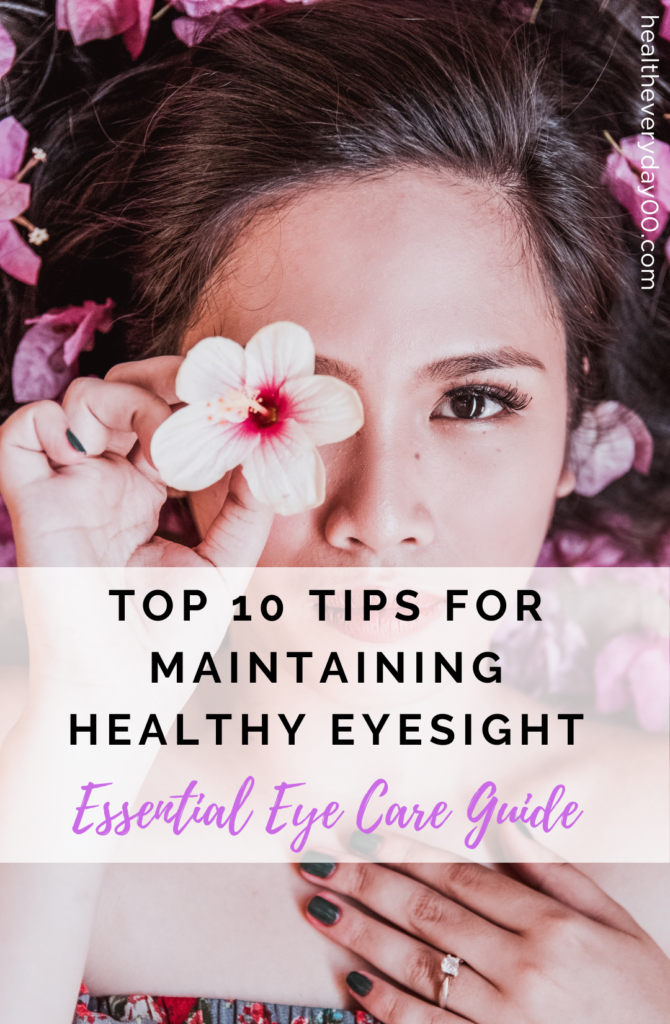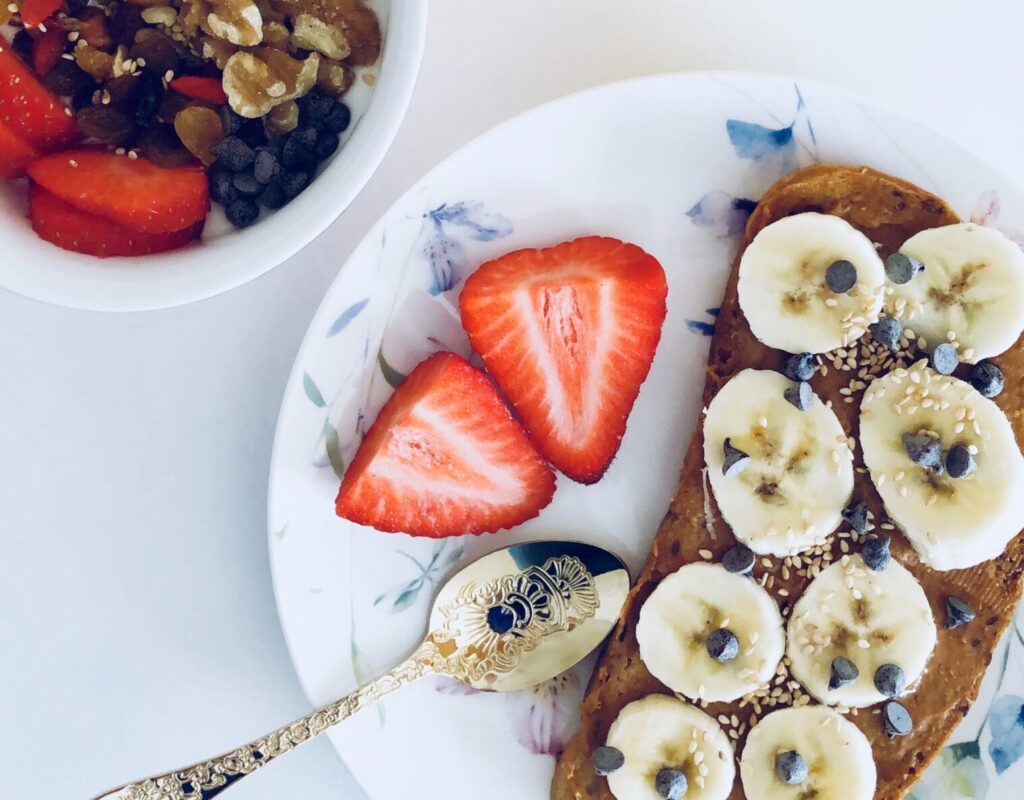Top 10 Tips for Maintaining Healthy Eyesight

- Top 10 Tips for Maintaining Healthy Eyesight
Introduction
Our eyes are one of our most precious assets, and maintaining good eye health is essential for enjoying a high quality of life. With the increasing demands of modern life, our eyes are exposed to various challenges, such as digital screens, pollution, and poor lifestyle choices. In this article, we will discuss the top 10 tips for maintaining healthy eyesight and keeping your vision in tip-top shape.
1. A Balanced Diet
Nutrients for Eye Health
A balanced diet plays a crucial role in maintaining eye health. Some essential nutrients for eye health include vitamins A, C, and E, zinc, lutein, zeaxanthin, and omega-3 fatty acids. These nutrients help protect the eyes from harmful blue light, reduce the risk of age-related macular degeneration, and maintain overall eye function.
Foods to Include in Your Diet
Including these foods in your diet can help ensure you’re getting the necessary nutrients for optimal eye health. Aim for a balanced diet with a variety of fruits, vegetables, whole grains, lean proteins, and healthy fats to support overall health and well-being.
1. Leafy greens
Spinach, kale, and collard greens are rich in lutein and zeaxanthin, antioxidants that help protect the eyes from harmful blue light and reduce the risk of age-related macular degeneration. They also contain vitamin C, which supports the health of blood vessels in the eyes.
2. Oily fish
Salmon, tuna, and sardines are excellent sources of omega-3 fatty acids, which are essential for maintaining healthy retinas and reducing inflammation. Omega-3s may also help prevent dry eyes and reduce the risk of age-related macular degeneration.
3. Citrus fruits
Oranges, lemons, and grapefruits are high in vitamin C, an antioxidant that helps protect the eyes from damage caused by free radicals. Vitamin C may also reduce the risk of cataracts and age-related macular degeneration.
4. Nuts and seeds
Almonds, sunflower seeds, and flaxseeds are rich in vitamin E, which is a powerful antioxidant that helps protect eye cells from oxidative damage. Nuts and seeds also contain essential fatty acids that support eye health.
5. Eggs
Eggs are an excellent source of lutein and zeaxanthin, as well as zinc, which is an essential trace mineral that plays a vital role in eye health. Additionally, eggs contain vitamin A, which supports the function of the retina and helps prevent night blindness.
6. Whole grains
Whole grains such as brown rice, quinoa, and whole wheat bread are rich in dietary fibre, which helps maintain healthy blood sugar levels and reduces the risk of age-related macular degeneration. They also contain essential B vitamins, which support the overall health of the eyes.
7. Legumes
Beans, lentils, and chickpeas are rich in zinc, which helps transport vitamin A from the liver to the retina and is crucial for maintaining good vision and eye health. Legumes are also a good source of protein and fibre, which can contribute to overall health and well-being.
8. Colourful fruits and vegetables
Carrots, sweet potatoes, and red peppers are high in beta-carotene, which the body converts into vitamin A, essential for maintaining good vision and eye health. Blueberries, on the other hand, contain antioxidants called anthocyanins that help protect the eyes from oxidative stress and inflammation.
2. Regular Exercise
Physical activity can help maintain good circulation, reduce inflammation, and support healthy blood pressure – all of which are essential for optimal eye health. Aim for at least 30 minutes of moderate exercise daily, such as brisk walking, swimming, or cycling.
3. Proper Sleep and Rest
Getting adequate sleep is essential for overall health, including your eyes. Aim for 7-9 hours of quality sleep each night to ensure your eyes have enough time to rest and repair. Additionally, take regular breaks throughout the day to give your eyes a chance to relax.
4. Eye Protection from the Sun
Choosing the Right Sunglasses
Prolonged exposure to the sun’s ultraviolet (UV) rays can increase the risk of cataracts and other eye conditions. Invest in a pair of sunglasses that block 100% of UVA and UVB rays to shield your eyes from harmful sunlight. Look for sunglasses labelled as ‘UV400’ or ‘100% UV protection’.
5. Digital Screen Breaks
The 20-20-20 Rule
In today’s digital age, we spend a significant amount of time in front of screens, which can lead to digital eye strain. To alleviate this issue, follow the 20-20-20 rule: every 20 minutes, take a 20-second break and look at something 20 feet away. This simple practice can help reduce eye strain and maintain your eye health.
6. Stay Hydrated
Proper hydration is essential for overall health and also plays a role in maintaining eye health. Drinking enough water can help prevent dry eyes and support the eyes’ natural function. Aim for at least 8 glasses of water daily to stay well-hydrated.
7. Quit Smoking
Smoking increases the risk of developing eye-related diseases such as cataracts, age-related macular degeneration, and optic nerve damage. Quitting smoking is one of the best things you can do to preserve your eye health in the long run.
8. Manage Chronic Conditions
Certain chronic conditions, such as diabetes and high blood pressure, can negatively affect your eye health. Managing these conditions effectively through regular check-ups, medication, and lifestyle changes can help preserve your vision and maintain healthy eyesight.
9. Regular Eye Examinations
Regular eye examinations are vital in detecting eye conditions and ensuring your vision remains clear. Visit your optometrist at least once every two years, or more frequently if you have a family history of eye problems or existing eye conditions.
10. Cleanliness and Eye Care
Maintaining good hygiene and cleanliness is essential for eye health. Avoid touching your eyes with dirty hands, and clean your eyewear and contact lenses regularly. Replace your contact lenses as recommended by your optometrist, and use fresh contact lens solution daily.
Suggested Supplements for Eye Health
Omega-3 fatty acids
Omega-3 fatty acids, particularly EPA and DHA, are essential for maintaining eye health. They help reduce inflammation and support the retina’s function. Sources of omega-3 supplements include fish oil, krill oil, and algae-based supplements.
Lutein and Zeaxanthin
These two antioxidants are found in high concentrations in the macula, a part of the retina responsible for central vision. Lutein and zeaxanthin supplements may help protect against age-related macular degeneration and cataracts.
Vitamin A
Vitamin A is crucial for maintaining good vision and eye health. It supports the function of the retina and helps prevent night blindness. Vitamin A supplements are often available as retinyl palmitate or beta-carotene.
Vitamin C
This antioxidant helps protect the eyes from damage caused by free radicals and may reduce the risk of cataracts and age-related macular degeneration. Vitamin C supplements can be found in various forms, such as ascorbic acid or calcium ascorbate.
Vitamin E
Vitamin E is another powerful antioxidant that helps protect eye cells from oxidative damage. It may also reduce the risk of age-related eye diseases. Vitamin E supplements are typically available as alpha-tocopherol.
Zinc
Zinc is an essential trace mineral that plays a vital role in eye health. It helps transport vitamin A from the liver to the retina, where it is used to produce melanin, a protective pigment. Zinc supplements are available in various forms, such as zinc gluconate, zinc picolinate, or zinc citrate.
Bilberry extract
Bilberry, a relative of the blueberry, contains potent antioxidants called anthocyanins that may help improve night vision and protect against eye strain. Bilberry extract supplements are usually available in capsule or tablet form.
Ginkgo biloba
Ginkgo biloba is a popular herbal supplement that may help improve blood flow to the eyes and protect against oxidative damage. Some studies suggest that Ginkgo biloba may be beneficial in managing glaucoma and age-related macular degeneration.
Astaxanthin
Astaxanthin is a powerful antioxidant found in certain algae and seafood, such as salmon and shrimp. It may help protect the eyes from oxidative stress, inflammation, and age-related eye diseases. Astaxanthin supplements are usually available in capsule form.
Always consult your optometrist or healthcare professional before starting any supplementation, as they can guide you on the best options for your specific needs and help you determine the appropriate dosage.
Conclusion
Maintaining healthy eyesight is crucial for enjoying a high quality of life. By following these top 10 tips, including a balanced diet, regular exercise, eye protection, and routine eye examinations, you can help ensure your vision remains clear and sharp for years to come.



